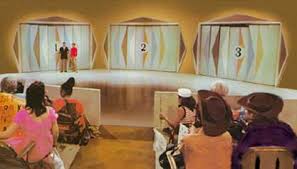6/21/18
The Limits Of Mathematics
The limits of mathematics can be illustrated by this paradox:
A lion wants to catch and eat a zebra,
but before it can do that, it must first travel halfway to the zebra.
After travelling halfway to the zebra, it still wants to catch the zebra,
but again - it must first travel halfway to the zebra.
That is a mathematical fact. Therefore, the lion can never catch the zebra.
In reality, we know this is wrong.
Sometimes the lion does catch the zebra despite it being mathematically impossible.
This proves that, as powerful a tool as mathematics is,
it must be tempered with knowledge and logic before being applied to reality.
permanent link
(click here first, then copy from address bar above)
4/5/17

The old TV game show "Let's Make A Deal" hosted by Monty Hall,
presented a contestant with 3 doors. Behind one door was a fabulous prize.
Behind the other two doors were worthless consolation prizes.
After a contestant selected a door (say #1),
Monty would then reveal what was behind one of the two unchosen doors (say #2).
The door Monty opened would always contain a worthless consolation prize.
Monty would then ask the contestant
"Before I open the door you selected (#1),
do you want to switch your door for the one remaining door (#3),
or do you want to keep your door?"
The contestant would then either switch doors (#1 for #3) or keep their door,
and then Monty would open the door that the contestant had chosen.
Should the contestant switch doors or keep the original one?
Intuition convinces most people that, regardless of the removal of one door,
you now have a choice between 2 doors, giving them a 50% chance of winning.
Most contestants will keep the original door
to avoid the regret (in case they lose)
that would result from mistrusting their original intuition.
The answer is that the odds are 2-1 in favor of switching doors!
If the explanations you have read for the "Monty Hall" problem seem confusing,
try this simple two-part explanation that I designed:
1) The only way to win if you keep your door
is if you chose the winning door initially:
this happens 1/3 of the time.
2) The only way to win if you switch doors
is if you chose a losing door initially:
this happens 2/3 of the time.
So you double your chances of winning ... by switching doors.
This is an excellent example of
Bayes' Theorem,
which, when translated from math jargon into English,
states that prior events must be taken into consideration
when computing future probabilities.
In the Monty Hall problem above,
you
must consider the removal of one of the doors.
The various explanations that have been given,
which explain why you double your chances of winning by switching doors,
have caused many thousands of well-educated people
to write angry letters in rebuttal.
Intuition is powerful in the human species.
Intuition can lead us to marvelous discoveries,
but if not guided properly by rational thinking skills,
intuition can also lead us to false conclusions;
and when combined with an inflated ego,
it can prevent us from admitting when we are wrong.
What those people will likely do
when confronted with the solution above
(one that even they admitted to)
is that they will ignore it,
and then they will begin presenting their own "solution"
to prove that the odds are even.
Don't let them get away with that.
Don't allow yourself to get covered in bullshit
just because they refuse to admit that they were wrong.
The "Law of non-contradiction" which is one of the 3 foundational laws of logic,
states that two or more contradictory statements
cannot both be true in the same sense at the same time.
The law of noncontradiction
The 2 statements in my proof are true. There is no escape.
Therefore, until they can disprove the solution above, their solution is irrelevant.
That is because the law of non-contradiction will not allow it.
Here is a different application of Bayes' Theorem:
Video 10:36 (but you only need to watch the first 6 minutes)
permanent link
(click here first, then copy from address bar above)